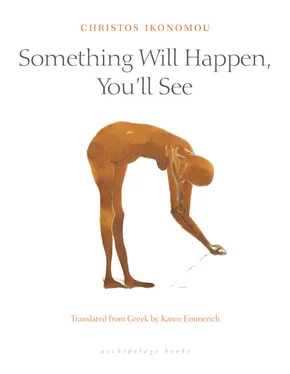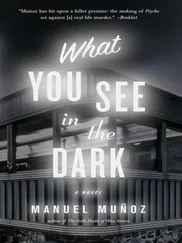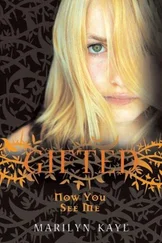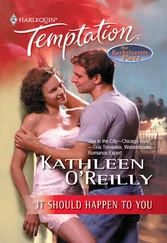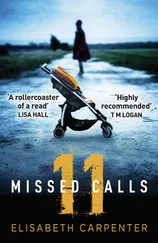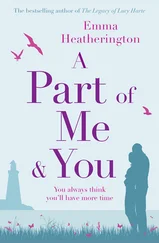Things are different now. Other times, another house, other clothes — even the smell in the closet is gone. It seems to me that everything has lost its smell. Or maybe it’s just me who lost those smells, who knows.
The heat is off and there’s cold air coming in around the kitchen window. I stuff paper napkins into the cracks and push them down hard. Then I see the box of tacks sitting on the kitchen table.
I pour out another tsipouro and then open the box, take out a tack and put it in my mouth. It tastes bitter.
It’s December and there’s a full moon and a clear sky full of stars. I remember Petros telling me once that somewhere way back when, in Peru or maybe Mexico, people believed that humans were born from stars. Rich people had descended from a golden star and poor people from a bronze one. That’s why they can’t ever be equal. Because they were born into different worlds.
It really is strange, to be poor.
The wind is still whistling through the cracks. I look at the stars which from here all look the same — exactly the same, not gold and not bronze either. The tack feels cold in my mouth.
It must be cold where Petros is tonight.
Piece By Piece They’re Taking My World Away
THE WAVES FELL on the shore like shipwrecked men, broken-spirited, disheartened and weak, one after another, with clipped moans, small sighs, one after another. The squall had begun to die down in mid-afternoon and now the sun was shaping a huge burning hourglass over the calm waters which were full of seaweed and branches and pinecones and tin cans and plastic bags and broken fishcrates — thin bleached sticks like the bones of fish that had been eaten by bigger fish. But in the distance past the mouth of the bay the clouds had started to turn red again and to sink low over the sea, growing and growing until they once more snuffed out the horizon.
It was past seven but the machines were still at work — a hum rose from deep in the mountain’s guts, disturbing the tranquility of the landscape. Eminent domain.
Look at that, he told her, pointing to the hourglass. If I had a boat I would take you to where the water becomes fire and you’d grab them both in your hands and hold them, the water and the fire too. Both together. Water and fire. Wouldn’t that be nice?
Niki shooed a fly from her knee and threw her head back and looked upside-down at the cloud of dust rising between the blackened slopes of the mountain.
But you don’t have a boat, she said. You don’t even have an oar. You don’t have anything.
He didn’t reply. Eminent domain. He kept his arm stretched out — hand in a ball, index finger pointing — and let his mind wander to heroic thoughts. He imagined he was a warrior leading a troop of other warriors, pointing to the object of some daring mission, an enemy stronghold they had to conquer at all costs.
Sorry, Niki said. She turned to look straight forward again and stirred the ice in her drink with a finger and took a sip. I didn’t mean it. That you don’t have anything. I didn’t mean it. You’ve got words, that’s for sure. And imagination. Go on, I’m listening. What kind of boat would it be? Rowboat or sailboat? Motorboat? Tell me, I’m listening. How long has it been since you told me a story? Talk to me. Talk.
• • •
They were sitting under the old olive tree in the garden drinking martinis out of plastic cups. That morning they had sent off the last of their things by truck. All that was left was a single suitcase and an old mattress for them to sleep on that night, their last in the house. Eminent domain. They had been living in that house for five years. Five whole years. It was the nicest house they’d ever lived in, a real house, the kind they don’t build anymore. There wasn’t another like it in all of Salamina. Old, sure, but solid as a fort, with stone walls like ramparts, wooden beams, a tile roof, huge rooms — cool in summer, warm in winter — with fireplaces and a cellar and big windows that looked onto the sea. And around the house an enormous garden, an estate, really, with olive and orange trees, pine trees, and eucalyptus trees that on summer afternoons cast their shade over the low stone wall and in the sunny gaps between shade lizards lay motionless gathering sun to warm themselves, small ones and big ones, all of them green, salamanders and geckos with bulging eyes and long skinny tails.
Eminent domain. They were expropriating the property. The new road to the port on the far side of the island, behind the mountain, would pass through here. The guy who owned the place hadn’t fought it at all. He didn’t care. It was a lot of money and he lived abroad, he was a foreigner now, had emigrated to Belgium or Germany a long time ago, hadn’t set foot on the island in years.
Eminent domain.
• • •
At night the locals came and took stones from the wall around the property. They came with pickup trucks and brought tools to loosen the stones and casually loaded them onto the beds of their trucks, slow and easy, taking their time. They were beautiful stones, big solid hand-chiseled slabs, they made you happy to look at and touch. The first night the locals came he yelled at them. Get lost, you buzzards, he shouted. You buzzards, you crows, aren’t you ashamed? There are still people living here, get lost. Buzzards. Get out of here. He shouted and cursed and at one point it almost came to blows. But eventually he got tired of shouting and cursing and fighting. What was the point? What difference did it make, today or tomorrow. What was the point. A soul that’s ready to leave will leave.
No use wasting our energy, he told Niki. We need to keep something in reserve for the future, for whatever’s in store for us up there. It’s a tactical move, see.
• • •
They were leaving for Kyustendil up in Bulgaria. A friend of a friend had opened a hotel up there and was looking for employees, he didn’t trust the locals. He was looking for people he could depend on, without obligations, willing to work hard. The money was good. Good for Bulgaria, at any rate. They thought it over pretty hard, discussed it, and in the end said they’d give it a shot. He’d been the one to insist, he thought they should go. It’s an opportunity, he told Niki. You see what’s happening here. There’s no way of getting ahead. It’s over, we’re over. It used to be that you worked your whole life for a bit of bread, now you work for a handful of crumbs. It’s Bulgaria, sure, but that doesn’t bother me. They say it’s nice up there. Countryside mountains rivers forests. There are hot springs. And cherries. People say they grow the best cherries in the world up there. Lord, fresh cherries. And waterfalls, too. Here you can’t even drink from the tap anymore. We spend fifty euros a month just on bottled water. It’s over here, it’s all over. You can’t get ahead.
I say we go. It can’t be worse than here.
• • •
Now, in the yard, he didn’t respond. He reached down, tossed some ice cubes in his cup and filled it, then glanced at the hourglass that was rapidly shrinking and vanishing over the dark murky blue waters. He wasn’t a warrior. A warrior fights to protect things he has and doesn’t want to lose, or fights for things he doesn’t have but wants to obtain. A warrior doesn’t flee the field of battle to go and work for someone else. At a hotel. In Kyustendil, Bulgaria. Hot springs. Like Aidipsos, only in Bulgaria.
Niki closed her eyes, threw her arms back and stretched in her chair, then sat there as still as a gecko gathering sun to warm its cold blood. In the sunlight her armpits gleamed white and soft and smooth. He raised his sunglasses to his forehead and stared at her for a long time. He wanted to lick her armpits. Wanted to lick the sweat, which smelled of apples and salt, from her armpits. He wanted to suck up all the air between them and make it disappear, to demolish the distance between them, to destroy all the things that kept them apart.
Читать дальше
